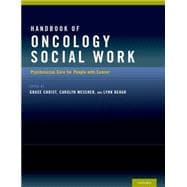The development of this inaugural Handbook of Oncology Social Work: Psychosocial Care for People With Cancer provides a repository of the scope of oncology social workers' clinical practice, education, research, policy and program leadership in the psychosocial care of people with cancer and their families. It focuses on the unique synergy of social work perspectives, values, knowledge, and skills with the psychosocial needs of cancer patients, their families, and the health care systems in which they are treated. It addresses both the science and art of psychosocial care and identifies the increasing specialization of oncology social work related to its unique knowledge base, skills, role, and the progressive complexity of psychosocial challenges for patients with cancer.
This Handbook equips the reader with all that we know today in oncology social work about patient and family centered care, distress screening, genetics, survivorship, care coordination, sociocultural and economic diversity, legal and ethical matters, clinical work with adults living with cancer, cancer across the lifespan, their caregivers and families, pediatrics, loss and grief, professional career development, leadership, and innovation. Our hope is that in reading this Handbook you will identify new areas where each of you can leave your mark as innovators and change agents in our evolving field of practice.








